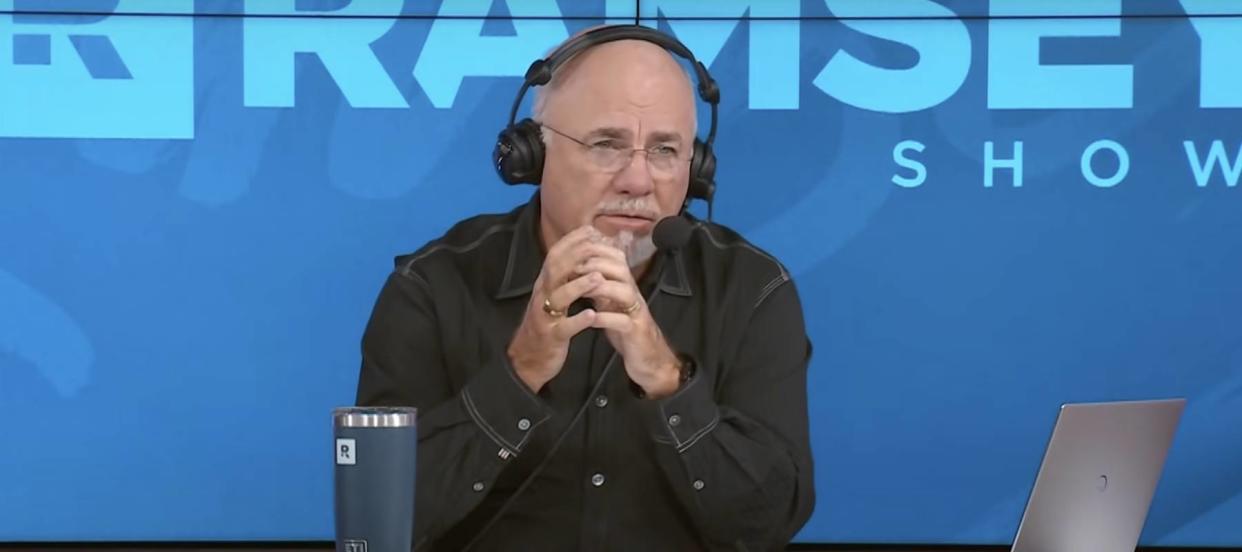‘Don’t do it, don’t do it!’: Researcher from Maryland wants to refinance her home despite high interest rates to pay off $60,000 in credit card debt. Dave Ramsey has a better solution

The average credit card interest rate is now at 24.66%, per LendingTree. That makes it one of the most expensive ways to borrow money.
Which is why it may seem reasonable to pay off that debt with a cheaper form of credit. Courtney, a divorced mom from Baltimore, Maryland, was considering such a move since she could tap into the equity of her home to pay off her $60,000 balance on various credit cards.
Don't miss
'It's not taxed at all': Warren Buffett shares the 'best investment' you can make when battling rising costs — take advantage today
Car insurance rates have spiked in the US to a stunning $2,150/year — but you can be smarter than that. Here's how you can save yourself as much as $820 annually in minutes (it's 100% free)
Jeff Bezos told his siblings to invest $10K in his startup called Amazon, and now their stake is worth over $1B — 3 ways to get rich without having to gamble on risky public stocks
Personal finance expert Dave Ramsey, however, wasn’t convinced this was a good idea. “Don’t do it, don’t do it, don’t do it,” said co-host John Delony on an episode of "The Ramsey Show." “You’re getting ready to make an error,” Ramsey chimed in.
Ramsey said he has a better solution which could also apply to other people in similar debt situations.
Consumer debt crisis
By some measures, Courtney is in a relatively strong position. She works as a public health researcher earning about $101,000 a year. She also purchased property years ago which is now worth $430,000, according to a recent appraisal.
Her early entry into the housing market and high-income give her an edge over many Americans. At the end of 2023, the median earnings for a worker with a Bachelor's degree was $1,608 a week or just over $83,000 a year, according to data from the Bureau of Labor Statistics. Meanwhile, the homeownership rate across the U.S. was 65.7%, according to the Federal Reserve.
Read more: Suze Orman says Americans are poorer than they think — but having a dream retirement is so much easier when you know these 3 simple money moves
However, the rising cost of living has driven many high income, well educated people into debt. Forty-five percent of Americans earning more than $100,000 were living paycheck-to-paycheck as of November 2023, according to a report by LendingClub.
Courtney’s situation isn’t unusual, however her debt burden could be. She has $60,000 outstanding on various cards, which is much higher than the average credit card balance of $6,501 on Experian’s database.
Considering the equity built up in her home, Courtney is tempted to sign up for a cash-out refinance to pay off the cards. However, Ramsey said this wouldn't improve the situation. “You’re solving a short-term problem with a long-term solution,” he told her.
Long-term solution
Refinancing would push Courtney’s housing costs higher. She also claimed she wouldn’t have access to a top-tier lender because of her credit score, which further complicated the situation.
Instead of refinancing, Ramsey and Delony encouraged her to steadily save up part of her monthly paychecks to pay down the credit cards over time. “You’ve treated this credit card debt like it’s cute,” Ramsey told her. “You said the only reason you’re not running up more debt is because they won’t let you, not because you got yourself under control.”
Shifting this pattern of spending could steadily reduce Courtney’s outstanding balance. Assuming she continues to earn more than $100,000 a year, Delony estimated she could eliminate the $60,000 balance within two years.
To get there, she needs a “beans and rice” budget that is focused exclusively on the essentials.
What to read next
Thanks to Jeff Bezos, you can now use $100 to cash in on prime real estate — without the headache of being a landlord. Here's how
Rich young Americans have lost confidence in the stock market — and are betting on these 3 assets instead. Get in now for strong long-term tailwinds
Car insurance premiums in America are through the roof — and only getting worse. But 5 minutes could have you paying as little as $29/month
This article provides information only and should not be construed as advice. It is provided without warranty of any kind.
